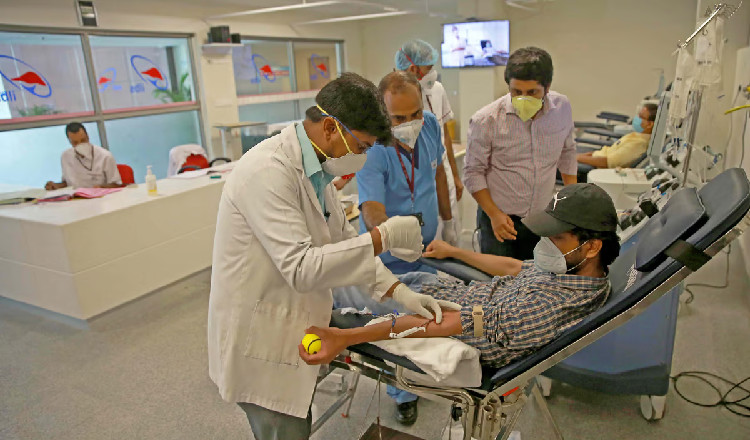
New Delhi: According to a year-long government study published in the Indian Journal of Medical Research (IJMR), around 10% of prescriptions from tertiary care and teaching hospitals in India exhibited "unacceptable deviations," such as inappropriate medication prescriptions or multiple diagnoses. Conducted by 13 ICMR Rational Use of Medicines Centres (RUMCs) across the country, including prestigious institutions like Delhi AIIMS and Safdarjung Hospital, the study analyzed 4,838 prescriptions from August 2019 to August 2020. These deviations could lead to increased costs for patients, higher probabilities of adverse drug reactions, and treatment failures. All prescribers in the study were postgraduates with an average practice experience ranging from four to 18 years. Among the 475 prescriptions showing deviations, 102 listed more than one diagnosis, some including inappropriate medication. The identified drugs with unacceptable deviations included pantoprazole, rabeprazole and domperidone combination, trypsin/chymotrypsin, serratiopeptidase, ranitidine, azithromycin, cefixime, amoxicillin and clavulanic acid combination, and aceclofenac. It was noted that these drugs were sometimes prescribed not only to address symptoms but also to counter potential side effects of other prescribed medications. For instance, analgesics were co-prescribed with pantoprazole for patients presenting with pain, despite the risk of unnecessary side effects like abdominal bloating, edema, and rash. Similarly, a combination of rabeprazole and domperidone along with antacids was prescribed for functional dyspepsia, contrary to national/international guidelines. In the study, patients with bilateral knee pain due to osteoarthritis were often prescribed trypsin/chymotrypsin alongside analgesics and/or serratiopeptidase with antibiotics. However, the scientific evidence supporting the use of serratiopeptidase was deemed insufficient. Additionally, the prescription of the fixed-dose combination (FDC) of trypsin plus chymotrypsin was criticized as irrational, leading to increased therapy costs. In cases of upper respiratory tract infections (URTI), inappropriate co-prescriptions of azithromycin and the FDC of amoxicillin plus clavulanic acid were noted, potentially contributing to antimicrobial resistance (AMR) in the long term. Furthermore, cefixime was prescribed for acute otitis media, contrary to recommended first-line treatments, along with an antihistamine, analgesic, and anti-ulcer drug, representing an unacceptable deviation. Although most physicians followed disease-specific ICMR guidelines, adherence was approximately 55%. In instances lacking Indian guidelines or recent updates, physicians referred to international guidelines, which are regularly updated and easily accessible in the public domain. The study examined outpatient prescriptions from physicians across various specialties in tertiary care, teaching hospitals, both government and private, throughout India. Eligible patient prescriptions upon exiting the outpatient department (OPD) or hospital pharmacy were collected and analyzed to identify deviations. To address these deviations, clinicians suggested potential interventions such as online training in rational prescribing and implementing administrative directives. Inappropriate medication prescribing poses significant clinical concerns, impacting patient efficacy, safety, and economic factors. Thus, clinical practice should prioritize individualized treatment based on rational prescribing principles, as advocated by the study. Although the World Health Organization (WHO) established a definition of rational medication use over three decades ago in 1985, inappropriate prescribing remains prevalent, with over 50% of medications globally prescribed or dispensed inappropriately and 50% of patients failing to comply with their medication regimens. Such inappropriate prescribing practices can lead to increased adverse drug reactions, hospitalizations, and treatment costs. Examples of inappropriate medication use include opting for injectable or expensive drugs over cheaper alternatives, polypharmacy, unjustified antibiotic usage, failure to adhere to clinical guidelines, and patient non-compliance with prescribed regimens.

ബംഗളൂരു: കന്നഡ സൂപ്പർ താരം ദർശൻ്റെ മൂന്ന് വളർത്തു നായ്ക്കൾ ആക്രമിച്ചെന്നാരോപിച്ച് ഒരു ലേഡി ഡോക്ടർ പോലീസിൽ പരാതി നൽകി. ആർ.ആർ നഗർ പൊലീസ് സ്റ്റേഷനിൽ ഡോക്ടർ അമിതയാണ് ദർശനെതിരെ പരാതി കൊടുത്തത്.
Puducherry: A resident doctor at the Indira Gandhi Government General Hospital and Post Graduate Institute (IGGGHPGI) in Puducherry faced a severe neck injury after being attacked with a knife by the father of a patient who was apparently under the influence of alcohol late on Monday.
ഭുബനേശ്വർ: ഒഡീഷയിലെ ഗഞ്ചം ജില്ലയിൽ ഡോക്ടറെ ആത്മഹത്യ ചെയ്ത നിലയിൽ കണ്ടെത്തി. തൻ്റെ ഭാര്യ വീട്ടിലാണ് ഡോക്ടറെ ആത്മഹത്യ ചെയ്ത നിലയിൽ കണ്ടെത്തിയത്. ഡോ. സുരേന്ദ്ര നാഥ് രഥ് (51) ആണ് മരണപ്പെട്ടത്.
പാത്ന (ബീഹാർ): ബി.ജെ.പി എം.എൽ.എ ആയ പ്രണവ് കുമാർ തന്നെ ഗുരുതരമായ പ്രത്യാഘാതങ്ങൾ നേരിടേണ്ടി വരുമെന്ന് പറഞ്ഞു ഭീഷണിപ്പെടുത്തിയെന്നും കഴുത്ത് ഞെരിച്ച് കൊല്ലാൻ ശ്രമിച്ചെന്നും ബിഹാർ മുൻഗറിലെ സർക്കാർ ആശുപത്രിയിലെ ഒരു ഡോക്ടർ ആരോപിച്ചു.
ലക്നൗ: ലക്നൗവിൽ ഗർഭിണിയായ യുവതി റോഡരികിൽ പ്രസവിച്ച സംഭവം രാജ്യത്തെ മുഴുവൻ നടുക്കിയിരിക്കുകയാണ്. ശേഷം കുഞ്ഞിനെ വീരാംഗന ഝൽകാരി ഭായ് വിമെൻ ആൻഡ് ചൈൽഡ് ഹോഡ്പിറ്റലിൽ എത്തിച്ചെങ്കിലും രക്ഷിക്കാൻ ആയില്ല.
We have various options to advertise with us including Events, Advertorials, Banners, Mailers, etc.